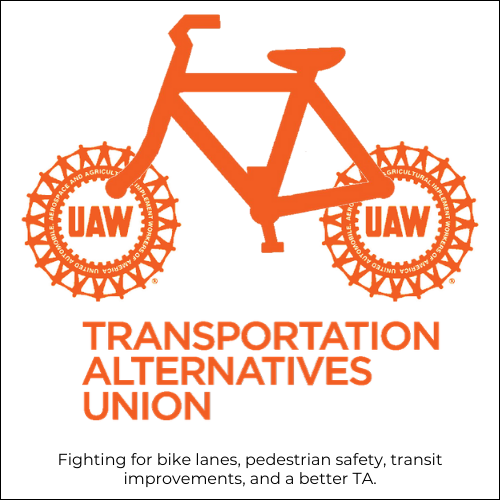Some may think it is ironic that Transportation Alternatives staff would forge an affiliation with United Auto Workers. In fact, TA Executive Director Danny Harris expressed that very concern in a letter to staff suggesting that TA does not believe a union is necessary and encouraging us to weigh the effect that our organizing drive might have on our brand, reputation and mission to “reclaim NYC’s streets from the automobile…”
So let us explain. In order to safeguard our rights as workers, we have been coordinating with Local 2110 UAW, a union for technical, office and professional workers in universities, publishing, museums, law firms, and other offices. The union represents teachers, secretaries, administrators, editors, computer operators, librarians, museum curators, typesetters, graphic artists, and many others (although no actual auto workers).
It will be our honor to organize alongside workers from the ACLU, Bronx Museum of Arts, Columbia University, MoMA, The New-York Historical Society, Good Ole Lower East Side, and others. As for being in the same tent as United Auto Workers, we believe unionizing is about harnessing the collective power of workers.
Plus, who knows what kind of transformative change to our streets can happen when Transportation Alternatives staff and auto workers come together?
We are advocating for a voice and a seat at the TA table, to bring about better working conditions and to drive the mission of the organization. We wish to not just be employees, but partners in reaching shared goals. We believe collective bargaining can enable true accountability from management and a more stable, secure, and democratic TA. Integral to that is valuing, respecting, and maintaining the institutional knowledge and contributions of all staff.
Similar to the staff at other non-profit organizations, we perform our jobs not only because we believe in the work; we also have to support ourselves, and for some of us, families, too. When workers call too much attention to grievances or push too hard on any agenda, however, much can be at stake, from career and financial risks to emotional well being and personal reputations.
No union = No Rights https://t.co/m1kjfRmpXC
— Transportation Alternatives Union (@TransAlt_Union) July 27, 2020
Strategies like “open-door policies,” unfortunately, do not seem to work — just like asking nicely for implementation of known life-saving measures on our streets doesn’t bring us the safety we need.
Unions are designed to benefit women, BIPOC, LGBTQ communities, individuals with disabilities — in other words, all staff.
As labor leader Karen Nussbaum has said, “The true face of the unions now is not a man in a hard hat as much as it is a woman in a classroom or in cleaning smocks.” Union efforts raise wages, expose salary disparities, enact anti-discrimination protections, encourage professional development, and enable grievance procedures.

We are proud and grateful to work at TA, one of the leading street-safety advocacy organizations in New York City. We are aware of the challenges TA and other non-profits face, particularly in this time of COVID-19, including overhead expenses and fundraising hardships. Ultimately, however, we think that our organizing drive will help TA strengthen its mission and achieve its social-justice goals.
Organizing ourselves during a pandemic has been quite a feat. We look forward to joining Local 2110 and believe that together, we can make a stronger, more equitable TA.
Dulcie Canton, HP Liao, Marian Jones, Alicia Perre-Dowd, and Chana Widawski are members of the organizing committee of Transportation Alternatives’s union (@TransAltUnion).






